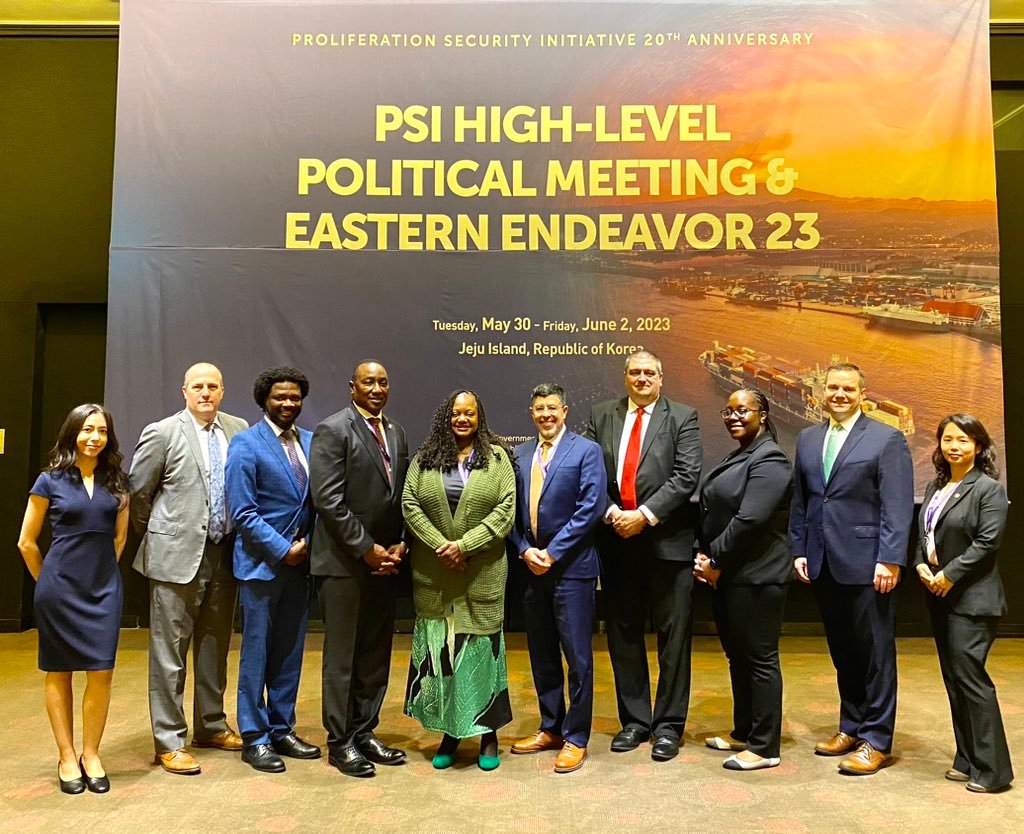Jeju-do, 30 May 2023 (TDI): Under Secretary for Arms Control and International Security at the Department of State, Ambassador Bonnie Denise Jenkins, delivered opening remarks today at the 20th Anniversary meeting of the Proliferation Security Initiative (PSI).
Hosted by the Republic of Korea, this significant gathering brought together distinguished participants from around the world to address the pressing issue of countering the spread of weapons of mass destruction (WMD).
Under Secretary Jenkins began her speech by expressing her honor to be present at such a momentous event on behalf of President Biden and Secretary Blinken. She acknowledged Vice Minister Lee for his opening remarks and extended gratitude to the Republic of Korea for hosting the meeting.
Highlighting the importance of the discussions and upcoming exercises, Under Secretary Jenkins emphasized the need to establish the future policy direction for PSI. She underscored the criticality of upholding the shared commitment to counterproliferation and ensuring that the interdiction of WMD remains a global norm.
Also Read: South Korea donates special passport scanners to Pakistan
Secretary Jenkins then presented greetings from President Biden, affirming the United States’ (US) unwavering dedication to preventing, countering, and ending the spread of weapons of mass destruction.
The President acknowledged the increasing challenges to the global security architecture posed by nations challenging non-proliferation norms. He emphasized the persistent concern of weapons falling into the wrong hands and the potential dangers posed by emerging technologies.
Recognizing that no single nation can address these challenges alone, President Biden expressed pride in PSI’s expansion to include over 100 countries worldwide.
He urged the participants to demonstrate continued resolve by implementing the PSI Statement of Interdiction Principles, enhancing information sharing, and deepening interdiction efforts. The President called for the expansion and growth of PSI to address new and emerging proliferation threats effectively.
Also Read: 11th ROK-IAEA High-level Policy Consultation
So, Under Secretary Jenkins concluded her remarks by expressing gratitude to all the participants for their commitment to stopping the proliferation of WMD, delivery systems, and related materials. She reaffirmed the collective determination to work together to make the world a safer place.
High-level meeting on prevention of WMD trafficking
A significant international conference on preventing the trafficking of weapons of mass destruction (WMD) will take place over four days (May 30-June 2) on Jeju Island, located in the southern part of the country.
The government has announced the convening of the Proliferation Security Initiative (PSI), a US-led initiative that celebrates its 20th anniversary this year. The PSI was established during the Bush administration to combat the illicit trafficking of WMDs, their delivery systems, and associated materials.
During the first day of the high-level forum on Tuesday, participants will evaluate the progress made over the past two decades and engage in discussions concerning existing challenges in the field of nonproliferation.
In conjunction with the PSI meeting, South Korea intends to conduct a multinational maritime exercise called “Eastern Endeavor 23.” This exercise aims to enhance cooperation among participating nations.
Also Read: US, South Korea to strengthen alliance & counter North Korea
When South Korea joined the PSI in 2009, it faced strong criticism from North Korea, which considered Seoul’s participation as a declaration of war. However, South Korea remained committed to its involvement in the initiative, recognizing the importance of preventing the spread of WMDs and maintaining global security.
Overall, the upcoming conference serves as a vital platform for international collaboration and knowledge sharing in the ongoing effort to counter WMD trafficking. By assessing past achievements and addressing current challenges, participating nations aim to reinforce their commitment to nonproliferation and contribute to a safer world.
Eman Mudassar Tarar is a student of International Relations at Quaid-i-Azam University, Islamabad and can be reached at emantarar26@gmail.com. She is currently working as a Research intern in the Institute of Peace and Diplomatic Studies. Her areas of interest are rooted in a deep passion for global politics, international relations, ongoing transnational developments as well as a strong commitment to advancing human rights and promoting social justice on a global scale. She writes as a columnist for various media outlets. The author tweets @the_emantarar.








